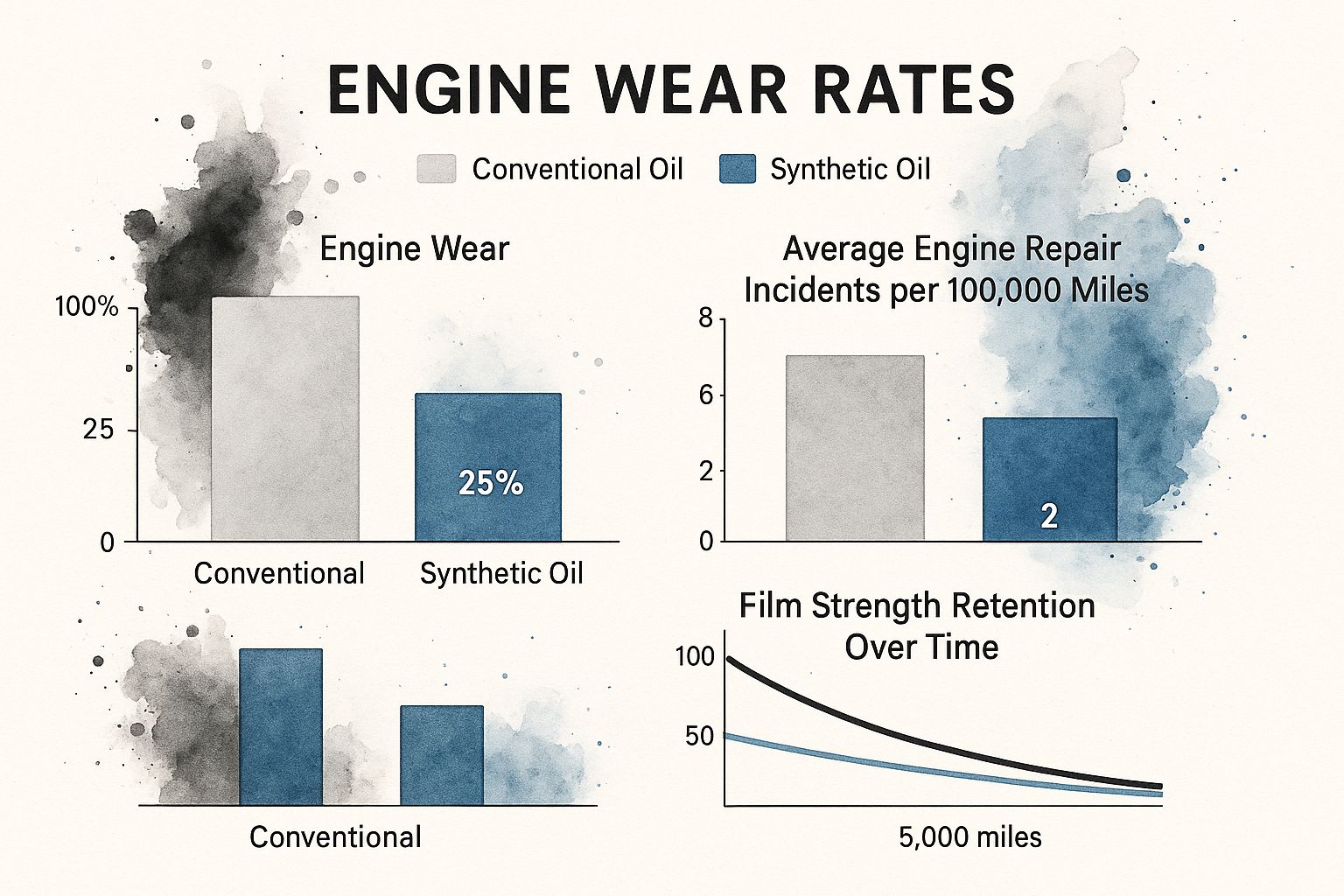Decoding the Oil Dilemma: Synthetic vs. Regular
Choosing between a synthetic oil change vs regular is crucial for your car’s health and your wallet. This listicle clarifies 7 key differences, empowering you to make the best decision for your vehicle and budget in 2025. We’ll cover composition, performance, longevity, engine protection, cost, environmental impact, and vehicle compatibility. Whether you drive in Keller, Watauga, North Richland Hills, or Haltom City, TX, understanding these distinctions is essential.
1. Composition and Manufacturing: The Heart of the Synthetic Oil Change vs Regular Debate
When considering a synthetic oil change vs regular, understanding the fundamental differences in their composition and manufacturing is crucial. This knowledge empowers you to make informed decisions about what’s best for your vehicle, whether you’re a resident of Haltom City, Keller, Watauga, North Richland Hills, or anywhere else. Synthetic oil is engineered in a laboratory through meticulously controlled chemical processes. These processes transform base materials into uniform, pure molecules. This results in a more refined and consistent product compared to conventional oil.

Conventional motor oil, on the other hand, is derived directly from crude oil through distillation and refining. While these processes remove some impurities, conventional oil retains many of the natural variations and contaminants present in the original petroleum. This inherent difference in the origin and processing of synthetic and conventional oils contributes significantly to their contrasting performance characteristics. For example, synthetic oils often utilize Group III, IV (PAO), or V (ester) base stocks, providing a superior foundation for enhanced performance.
Companies like Mobil 1, a pioneer in synthetic oil for consumer vehicles, exemplify the benefits of this advanced engineering. Their products, along with the Platinum line of full synthetics from Pennzoil, Castrol’s EDGE synthetic lineup, and Amsoil, the first API-qualified synthetic motor oil, demonstrate the success of synthetic oil in delivering superior engine protection and performance.
Features and Benefits of Synthetic vs. Conventional:
- Uniformity: Synthetic oils boast uniform molecular structures, leading to more consistent properties and predictable performance across a wider temperature range. Conventional oils, with their inherent variability, may not offer the same level of consistency.
- Customized Additives: The synthetic manufacturing process allows for the inclusion of customized additive packages, further enhancing performance characteristics such as wear protection, detergency, and oxidation resistance.
- Reduced Friction: The superior molecular uniformity of synthetic oils translates to less friction within the engine, potentially leading to improved fuel economy and reduced wear.
Pros of Synthetic Oil:
- More consistent properties and performance.
- Targeted performance characteristics through customized additives.
- Better molecular uniformity resulting in less friction and potentially improved fuel economy.
Cons of Synthetic Oil:
- More energy-intensive manufacturing process.
- Higher production costs resulting in higher consumer prices.
- Some argue that conventional oils may retain beneficial natural compounds, though this is debated.
When and Why to Use Synthetic Oil:
Synthetic oil is particularly beneficial in demanding driving conditions such as extreme temperatures, heavy loads, and stop-and-go traffic. It provides superior protection against wear and tear, helping to prolong engine life. While it comes at a higher initial cost, the potential long-term benefits, particularly for those prioritizing engine longevity and performance, often make it a worthwhile investment. Whether you’re a busy professional, a fleet manager, or a safety-conscious driver in the DFW area, understanding this key difference between synthetic and conventional oils allows you to choose the best option for your vehicle and driving needs.
2. Performance in Extreme Temperatures
One of the most compelling reasons to consider synthetic oil over conventional oil during your next oil change is its remarkable performance across a wide range of temperatures. This is a critical factor for vehicle owners in areas like Haltom City, Keller, Watauga, and North Richland Hills, TX, where we experience both scorching summers and occasional freezing winters. Synthetic oils are engineered to maintain optimal viscosity – or thickness – and flow characteristics even in extreme cold. This means faster engine protection during those critical cold starts when conventional oil can be thick and sluggish. On the other end of the spectrum, synthetic oil resists breaking down at high temperatures, providing superior protection during intense engine operation, like stop-and-go traffic on a hot Texas summer day. Conventional oils, on the other hand, tend to thicken significantly in cold weather, hindering engine performance, and break down faster at high temperatures, leading to reduced engine protection and potentially costly repairs.

Synthetic oils achieve this superior performance due to several key features. They boast significantly lower pour points – the temperature at which the oil begins to flow – often ranging from -40°F to -50°F, compared to -10°F to -20°F for conventional oils. They also exhibit better high-temperature viscosity stability, meaning they maintain their protective film strength even when the engine is running hot. This translates to reduced oil thickening in cold conditions and a superior film strength at operating temperatures, ensuring consistent lubrication and protection.
Pros:
- Faster engine protection during cold starts: Crucial for minimizing wear and tear during those first few minutes of operation.
- Better protection in extreme heat: Prevents oil breakdown and maintains lubrication even under intense driving conditions.
- Reduced engine wear during temperature fluctuations: Offers consistent performance and protection throughout the year.
- More consistent performance across all seasons: Eliminates the need to worry about changing oil viscosity for summer and winter.
Cons:
- Temperature advantages may not be noticeable in moderate climates: If you live in an area with consistently mild temperatures, the benefits might be less pronounced.
- Premium cost may not be justified for vehicles operating in mild conditions: Synthetic oil is more expensive than conventional oil, so the cost-benefit needs to be considered.
Examples of when synthetic oil shines:
- Arctic and desert environments: Where temperature extremes are the norm.
- Racing applications: Where engines operate at sustained high temperatures.
- Commercial vehicles: That must start reliably in subzero temperatures, ensuring timely deliveries and operations. This is particularly relevant for fleet managers in our area.
Tips for choosing synthetic oil:
- Consider full synthetic oil if you live in regions with temperatures regularly below 0°F or above 90°F, which are common occurrences in North Texas.
- For cold climates, look for synthetic oils with pour points below -40°F.
- In extremely hot climates, choose synthetics with high-temperature viscosity stability.
This point deserves a place on the “synthetic oil change vs regular” list because it addresses a crucial aspect of engine protection and performance that directly impacts longevity and reliability. For drivers in areas with fluctuating temperatures, especially extremes, understanding the advantages of synthetic oil’s temperature resilience is key to making informed decisions about vehicle maintenance. Whether you’re a busy professional, a fleet manager, or a safety-conscious driver in Haltom City or the surrounding areas, choosing the right oil can significantly affect your vehicle’s performance and lifespan.
3. Oil Change Intervals and Longevity
One of the most significant advantages of synthetic oil over conventional oil lies in its extended lifespan and the resulting longer intervals between oil changes. This factor plays a crucial role in the “synthetic oil change vs regular” debate. Synthetic oils are engineered to resist degradation, offering superior protection and performance for longer periods. While conventional oils typically require changes every 3,000-5,000 miles, synthetic oils can often last 7,500-15,000 miles, and in some cases even longer, depending on the specific oil, driving conditions, and manufacturer recommendations.

This extended performance stems from synthetic oil’s enhanced molecular structure and resistance to oxidation, thermal breakdown, and the formation of sludge and deposits. These oils often include enhanced additive packages designed for long-lasting protection. This translates directly into fewer oil changes needed annually, reducing both the hassle and the long-term maintenance costs, despite the initially higher price per quart of synthetic oil. For busy professionals in areas like Haltom City, Keller, TX, Watauga, TX, and North Richland Hills, TX, the convenience of less frequent service visits can be a significant advantage.
For example, many Toyota vehicles using synthetic oil recommend 10,000-mile intervals, while BMW and Mercedes-Benz often specify intervals of up to 15,000 miles with their recommended synthetic oils. Even more impressively, some specialized synthetic oils, like Mobil 1 Extended Performance, are rated for up to 20,000 miles under ideal conditions. Learn more about Oil Change Intervals and Longevity.
Pros:
- Fewer annual oil changes save time and reduce hassle.
- Lower lifetime maintenance costs due to reduced frequency of changes.
- Less environmental impact thanks to decreased oil disposal.
- Added convenience, especially for busy individuals and fleet managers.
Cons:
- Higher upfront cost per oil change compared to conventional oil.
- Extended intervals might not be suitable for severe driving conditions like frequent short trips, towing, or driving in dusty environments.
- Older engines with existing deposits may not fully benefit from extended intervals.
Tips for Maximizing Synthetic Oil Benefits:
- Adhere to Manufacturer Recommendations: Always consult your vehicle’s owner’s manual for the recommended oil type and change intervals.
- Adjust for Severe Conditions: Consider shorter intervals if your driving habits involve frequent short trips, heavy towing, or dusty conditions. These situations put extra stress on the oil and can shorten its lifespan.
- Utilize Oil Analysis: Oil analysis services can provide detailed information about your oil’s condition and help you determine if extending your change intervals is safe and beneficial.
- Regular Oil Level Checks: Even with extended change intervals, it’s essential to check your oil level regularly to ensure proper engine lubrication and avoid potential problems.
This extended lifespan and reduced maintenance frequency make synthetic oil an appealing option for vehicle owners seeking to minimize upkeep and maximize performance, especially in demanding driving conditions often encountered by local drivers and fleet operators. This directly addresses the key considerations when comparing a synthetic oil change vs. a regular one.
4. Engine Protection and Wear Reduction
One of the most compelling reasons to consider synthetic oil change vs regular is the superior engine protection it offers. Synthetic oils are engineered with a uniform molecular structure, unlike conventional oils derived from crude oil which contain a mix of different sized molecules. This consistent structure allows synthetic oils to maintain a stronger and more stable oil film between moving engine parts. This crucial film reduces friction and minimizes metal-to-metal contact, even under extreme pressure and temperature conditions. This protection is particularly important during cold starts, when most engine wear occurs due to inadequate oil flow.

This infographic visualizes data comparing wear reduction between synthetic and conventional oils under various operating conditions. It’s a bar chart showing the percentage of wear reduction achieved with synthetic oil compared to conventional oil in different scenarios like cold starts, high-speed driving, and stop-and-go traffic. The chart clearly demonstrates that synthetic oil consistently provides superior wear protection across the board, with reductions ranging from 40% to 75% depending on the specific condition. This substantial reduction in wear translates directly to a longer engine lifespan and reduced repair costs.
Synthetic oils also boast enhanced anti-wear additives that bond to metal surfaces, providing an extra layer of protection. Their improved detergent and dispersant properties keep the engine cleaner by preventing the buildup of sludge and deposits. These features combined contribute to reduced long-term engine wear and better protection during critical cold starts, potentially extending the lifespan of your engine. Learn more about Engine Protection and Wear Reduction
Features of Synthetic Oil for Engine Protection:
- Stronger, more stable oil film between moving parts
- Better shear stability under pressure
- Enhanced anti-wear additives that bond to metal surfaces
- Improved detergent and dispersant properties
Pros:
- Reduced long-term engine wear
- Better protection during critical cold starts
- Potential for extended engine lifespan
- Improved protection for turbocharged and high-performance engines
Cons:
- Benefits may be less noticeable in newer engines with tight tolerances
- Protection advantages diminish if change intervals are extended too far
Examples of Successful Implementation:
- Taxi fleets utilizing synthetic oils have reported significant reductions in engine repairs and a noticeable increase in engine life.
- Performance testing has shown up to 75% less wear with high-quality synthetic oils compared to conventional oils.
- Turbocharged engines running on synthetic oils experience significantly less bearing wear, a critical component in these high-performance engines. This is especially relevant for residents of Haltom City, Keller, Watauga, and North Richland Hills, TX, where many drivers own vehicles with turbocharged engines.
Tips for Using Synthetic Oil:
- Consider synthetic oil essential for turbocharged or supercharged engines.
- Using synthetic oil in high-mileage engines can help reduce ongoing wear and potentially prolong their life.
- When switching to synthetic oil, consider a shorter first change interval to effectively remove any existing deposits from conventional oil.
Companies like Shell Rotella (known for heavy-duty engine protection), Valvoline (with its Modern Engine protection formulas), and Pennzoil Ultra Platinum (featuring PurePlus Technology) have all popularized the benefits of synthetic oils for maximizing engine protection. Whether you’re a busy professional in need of reliable auto service, a fleet manager in Haltom City overseeing company vehicles, or a safety-conscious driver valuing premium parts, understanding the engine protection offered by synthetic oil versus regular oil is a key factor in maintaining your vehicle’s health and longevity.
5. Cost Comparison and Value Proposition
When comparing synthetic oil change vs regular, cost is often the first factor that comes to mind. While it’s true that synthetic oil changes have a higher upfront cost – typically ranging from $70 to $120 compared to $25 to $50 for conventional oil – understanding the complete cost picture requires a deeper dive into the value proposition. The longer change intervals, potential fuel efficiency gains, and the possibility of reduced engine wear all contribute to a scenario where synthetic oil could actually be more economical over the long haul. Learn more about Cost Comparison and Value Proposition
One of the key features of synthetic oil is its extended change interval. While conventional oil typically needs changing every 5,000 miles, synthetic oils can often last for 10,000 miles or even longer. This directly offsets the higher per-change cost. For example, a vehicle requiring conventional oil changes every 5,000 miles might need four changes per year (assuming 20,000 miles driven annually) at $40 each, totaling $160 annually. The same vehicle using synthetic oil with 10,000-mile intervals would only need two changes per year at $90 each, resulting in a yearly cost of $180. The $20 annual difference is often mitigated by other benefits.
Beyond extended intervals, synthetic oil offers the potential for a 1-2% improvement in fuel economy. While seemingly small, this can add up to noticeable savings over time, especially for high-mileage drivers. Furthermore, the superior lubrication and protection provided by synthetic oil can contribute to reduced engine wear and tear, potentially lowering long-term maintenance and repair costs. This is a particularly important factor for those intending to keep their vehicles for an extended period.
Pros of Synthetic Oil:
- Fewer total oil changes needed per year
- Potential savings on fuel costs
- Possible reduced engine repair costs over the vehicle’s lifetime
- Less time spent on maintenance
Cons of Synthetic Oil:
- Higher upfront cost per oil change
- Cost benefits are realized primarily when keeping the vehicle long-term
- May not be economical for older vehicles near the end of their service life
Tips for Evaluating Synthetic Oil:
- Calculate your personal cost-benefit: Factor in your annual mileage and local service prices to determine the true cost difference between synthetic and conventional oil for your specific situation. For residents of Haltom City, Keller, Watauga, and North Richland Hills, TX, local service pricing can vary, so it’s important to shop around.
- Consider DIY oil changes: Changing your own oil can significantly reduce the cost gap between synthetic and conventional options.
- Look for manufacturer rebates and promotions: Many synthetic oil manufacturers offer rebates and promotions that can make synthetic oil more affordable.
- Use manufacturer-approved synthetic oils: Ensure you’re using a synthetic oil approved by your vehicle’s manufacturer to maintain warranty coverage.
This cost comparison is a critical component when deciding between synthetic and conventional oil. While the initial price tag of synthetic might seem daunting, the potential long-term benefits, including extended change intervals, fuel economy improvements, and reduced engine wear, can make it a worthwhile investment, particularly for those who plan to keep their vehicles for many years. This factor makes the “Cost Comparison and Value Proposition” a crucial element in the synthetic oil change vs regular debate.
6. Environmental Impact and Sustainability
When comparing synthetic oil change vs regular, the environmental impact is a crucial factor for many car owners. This consideration extends beyond just the oil itself, encompassing the entire lifecycle from production and use to disposal. While synthetic oil might seem less eco-friendly at first glance due to its more energy-intensive production process, a closer look reveals a potentially smaller overall environmental footprint compared to conventional oil.
Synthetic oils offer significantly extended service life, typically requiring oil changes 2-3 times less frequently than conventional oils. This directly translates to a 50-70% reduction in waste oil generation. Fewer oil changes also mean less packaging waste from oil containers and filters. Furthermore, the improved fuel efficiency offered by synthetic oils contributes to lower lifetime carbon emissions from your vehicle. Some synthetic base oils are also inherently more biodegradable than conventional counterparts, further lessening the environmental burden in case of spills.
Several companies have made strides in improving the sustainability of synthetic oils. For example, Valvoline’s NextGen motor oil incorporates re-refined base oils, giving new life to used oil. Mobil 1’s Annual Protection formula is designed to last a full year, drastically reducing yearly waste oil by up to 75%. Pennzoil’s PurePlus Technology utilizes natural gas as a base stock, resulting in a cleaner base oil with lower production emissions compared to traditional crude oil-based methods.
Pros:
- Less total waste oil produced over vehicle lifetime.
- Reduced packaging waste from fewer oil changes.
- Lower lifetime carbon footprint through improved efficiency.
- Some synthetic oils now include renewable or recycled base stocks.
Cons:
- Higher energy input required for initial synthetic oil production.
- Some synthetic bases may take longer to biodegrade if spilled, although this varies depending on the specific formulation.
- Higher production emissions per quart produced, although this can be offset by the reduced frequency of changes.
Tips for Eco-Conscious Drivers:
- Proper Disposal: Always dispose of all motor oils (both synthetic and conventional) properly at designated recycling centers. Never pour used oil down drains or onto the ground.
- Consider Bio-Based Options: For environmentally sensitive applications, explore bio-based synthetic oils made from renewable resources.
- Follow Extended Drain Intervals: Adhere to the manufacturer’s recommended drain intervals for your specific synthetic oil to maximize the environmental benefits. Don’t change your synthetic oil prematurely.
- Carbon Offset Programs: If minimizing your environmental impact is a top priority, consider participating in carbon offset programs to compensate for the remaining emissions associated with your vehicle.
Why This Matters in the Synthetic Oil Change vs Regular Debate:
For drivers in areas like Haltom City, Keller, Watauga, and North Richland Hills, Texas, where environmental awareness is growing, understanding the sustainability aspects of their vehicle maintenance choices is increasingly important. Choosing synthetic oil, despite the higher upfront cost, can contribute to a smaller overall environmental impact throughout the vehicle’s lifespan. This makes the “synthetic oil change vs regular” discussion particularly relevant for eco-conscious drivers, busy professionals seeking less frequent maintenance, and fleet managers aiming to reduce their operational environmental footprint. By making informed choices and adopting sustainable practices, drivers can minimize their impact on the environment without compromising vehicle performance.
7. Vehicle Compatibility and Manufacturer Recommendations
One of the most crucial factors in the synthetic oil change vs. regular debate is vehicle compatibility and manufacturer recommendations. Engine technology has advanced considerably, and with these advancements come specific oil requirements. Simply put, what worked for your older car might not be suitable for your newer one. Understanding these requirements isn’t just about keeping your car running smoothly; it’s often a stipulation for maintaining your warranty.
Modern engines, particularly those with turbochargers, direct injection (GDI), or start-stop systems, often require synthetic oils. These engines operate under higher pressures and temperatures, demanding a more robust lubricant. Conventional oil can break down under these conditions, leading to sludge buildup, decreased performance, and potentially costly engine damage. Synthetic oils, engineered for superior performance and longevity, are better equipped to handle these stresses.
Features of vehicles requiring synthetic oil:
- Specific Synthetic Formulations: Many new vehicles require very specific synthetic oil formulations that meet stringent standards.
- Tighter Tolerances: Modern engines often have tighter internal tolerances, necessitating cleaner-burning oils like synthetics to prevent clogging and ensure proper lubrication.
- Warranty Requirements: Manufacturer warranties often stipulate the use of specific oil types and weights, commonly synthetic, to remain valid.
- Advanced Engine Technologies: Engines with advanced features like turbocharging and GDI almost universally specify the use of synthetic oils.
Pros of following Manufacturer Recommendations:
- Maintained Warranty Coverage: Adhering to the manufacturer’s specified oil ensures your warranty remains valid, protecting you from potentially expensive repairs.
- Optimal Engine Performance: Using the correct oil ensures your engine operates at peak performance and efficiency, maximizing fuel economy and power.
- Meets Engineering Requirements: Manufacturer-approved oils are specifically formulated to meet the unique engineering requirements of your engine.
- Protection for Specialized Technologies: Synthetic oils offer superior protection for the complex components found in modern engines, including turbochargers and direct injection systems.
Cons of using Manufacturer-Required Synthetics:
- Higher Ongoing Maintenance Costs: Synthetic oils are generally more expensive than conventional oils, leading to higher maintenance costs.
- Limited Oil Brand Choices: Specific manufacturer requirements may limit your choice of oil brands.
- Premium Vehicle Costs: Premium and European vehicles often require more expensive, specialized synthetic oils.
Examples of Manufacturer Specifications:
- BMW: Often requires LL-01 certified synthetic oils.
- GM: Uses the Dexos1 Gen 3 specification for many of their newer engines.
- Mercedes-Benz: Has 229.5 oil requirements for a large portion of their vehicle lineup.
- Volkswagen: Employs strict 504.00/507.00 oil specifications.
Actionable Tips for Choosing the Right Oil:
- Consult Your Owner’s Manual: Always refer to your owner’s manual for the specific oil requirements for your vehicle. This is the most reliable source of information.
- Verify Certifications: Look for oils that meet your vehicle’s exact certifications (API, ACEA, ILSAC, etc.). Don’t just assume any synthetic oil will work.
- Maintain Records: Keep detailed records of your oil changes, including the type and brand of oil used, to ensure you can demonstrate warranty compliance.
- Consider Dealer Service: For vehicles with very specific and complex oil requirements, consider using dealer service for oil changes to ensure absolute compliance.
- Not All Synthetics Are Equal: Remember, not all synthetic oils meet all manufacturer specifications. Always verify compatibility before using a particular brand or type.
Why This Matters in the Synthetic Oil Change vs. Regular Discussion:
Choosing between synthetic and conventional oil isn’t always a simple choice. For many newer vehicles, the decision is made for you by the manufacturer. Using the wrong oil can void your warranty and potentially damage your engine. This is why understanding vehicle compatibility and manufacturer recommendations is paramount when deciding between a synthetic oil change and a regular one. For residents of Haltom City, Keller, Watauga, and North Richland Hills, TX, adhering to these guidelines is essential for preserving your vehicle’s performance and longevity, especially given the demanding driving conditions of the region.
Synthetic vs Regular Oil: 7-Factor Comparison
| Comparison Factor | Composition and Manufacturing | Performance in Extreme Temperatures | Oil Change Intervals and Longevity | Engine Protection and Wear Reduction | Cost Comparison and Value Proposition | Environmental Impact and Sustainability | Vehicle Compatibility and Manufacturer Recommendations |
|---|---|---|---|---|---|---|---|
| Implementation Complexity 🔄 | High energy-intensive synthetic production processes | Moderate – requires selecting oils for temperature range | Low complexity; depends on extended intervals adherence | Moderate – requires adherence to change intervals | Low complexity; cost calculation needed | Moderate – consider production and disposal practices | Moderate – requires adherence to manufacturer specs |
| Resource Requirements ⚡ | High – lab processes and specialized base stocks | Moderate – requires specific additives for stability | Lower frequency of oil changes reduces resource use | Moderate – high-quality additives and uniform molecules | Higher upfront cost offset by fewer changes | Higher initial production energy, fewer oil changes | Moderate – use of certified oils and specific formulations |
| Expected Outcomes 📊 | Uniform, consistent oil quality and lower friction | Reliable engine function in extreme temperatures | Extended oil change intervals, less maintenance | Reduced engine wear, longer engine lifespan | Potential overall cost savings, improved fuel economy | Reduced waste oil/packaging and carbon footprint | Maintains warranty, optimal engine performance |
| Ideal Use Cases 💡 | High-performance/customized oils for precision needs | Extreme climates, racing, commercial cold start vehicles | Long-distance drivers, fleets, vehicles supporting long drain intervals | Turbocharged, high-performance, and high-mileage engines | Long-term vehicle owners seeking cost-efficiency | Eco-conscious users, fleets, vehicles emphasizing sustainability | Vehicles with strict OEM oil requirements |
| Key Advantages ⭐ | Consistent molecular structure; targeted performance | Low pour points; high-temp viscosity stability | Fewer oil changes; reduced sludge and deposits | Strong film, anti-wear additives, and shear stability | Fewer services; fuel economy gains; less engine wear | Less waste; renewable bases; lower lifetime emissions | Warranty compliance; optimized for modern engine tech |
Making the Right Oil Choice for Your Ride
Choosing between a synthetic oil change vs regular oil change is a crucial decision for any vehicle owner. This article has explored seven key differences between these oil types, ranging from their composition and manufacturing processes to their environmental impact. We’ve highlighted how synthetic oil excels in extreme temperatures, offers extended oil change intervals, and provides superior engine protection, while conventional oil often comes at a lower upfront cost. Understanding these distinctions empowers you to make an informed decision that balances performance, protection, and budget. Mastering these concepts is valuable because the right oil choice can significantly impact your engine’s lifespan, fuel efficiency, and overall performance, saving you money and reducing your environmental footprint in the long run.
Ultimately, the ideal oil for your car depends on factors like your vehicle’s age, your driving habits, and your budget. Whether you choose synthetic or conventional, regular oil changes are essential for maintaining a healthy engine. For drivers in Haltom City, Keller, Watauga, and North Richland Hills, Texas, looking for expert advice and reliable service for their next synthetic oil change vs regular oil change, Express Lube & Car Care is here to help. We offer expert oil change services using premium oils and advanced diagnostics to ensure your vehicle performs at its best. Visit us online at Express Lube and Car Care to schedule your appointment today and experience the Express Lube difference.





